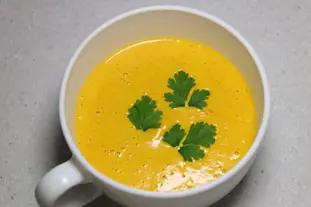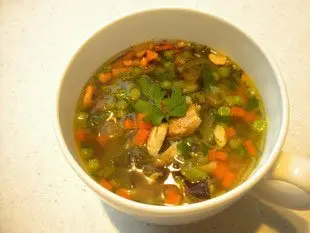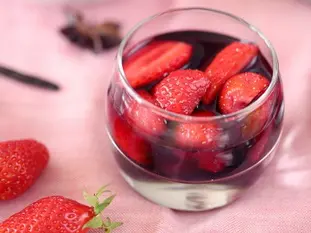Soup vs. potage

It's true that we're finally coming out of winter as I write these lines, and that we'll all be making, no doubt, a little less soup and potages, but even if it's out of season, it really is a simple and delicious dish, which is one of the always easy answers to "What's for dinner this (Sunday) evening?".
Speaking of soups and potages, even if they're very similar, do you know the difference?
Speaking of soups and potages, even if they're very similar, do you know the difference?
11 K
Keywords for this post:SoupPotageDifferenceCookingVegetablesBrothWaterLast modified on: April 9th 2022
Soup vs. potage
Soups

Basically, it's water and vegetables cut into small pieces, seasoned and cooked until the vegetables are well done, to obtain a soup.
Of course, the basic recipe can be enriched by replacing the water with broth or milk, for example, or by adding various small ingredients: leftover cooked meat, legumes, croutons, etc. etc. The only limit is your imagination, and what you have in your cupboards or fridge.
Potages

Basically, it always starts out as a soup: water + vegetables that you cook, but then there's the difference: you blend it or put it through a food mill, and you get a soup.
A soup that can also be enriched and improved by adding all kinds of ingredients: Cream, grated cheese, a little cornflour to thicken, etc.
The term "potage" comes from the 17th century, in the sense of "vegetables cooked in a pot", and then gave rise to "potager", a place where vegetables are grown for soup.
As you can see, it's more a question of texture: soup has chunks, while potage is smoother.
Having said that, this boundary is rather blurred, as the 2 words are used for a whole host of very different dishes on restaurant menus, for example, and thus fall outside the usual domain: starter or single dish, hot and savory.
Desserts include fruit soups, for example, which are often a fruit juice or a custard, or both, in which pieces of fruit are placed.
In short, with the imagination of chefs, a soup is just about any dish, made up of a liquid part and a solid part in small pieces, strawberry soup for example.

Other words
In addition to soup and potage, there are other related words, a little outdated nowadays, to designate more specific kinds of soup:
Consommé: In principle, this is a soup in which the water is replaced by a broth, usually beef, which is fairly full-bodied and sometimes with wine added. In ancient times, it was a popular starter at festive meals.
Velouté: This is a soup generously enriched with cream, and sometimes bound with a little cornflour, and very carefully blended or even sieved, all to obtain something very smooth and creamy.
Bisque: This is a soup based on cream and shellfish (lobster, shrimp, etc.).
All these appetizing variations should not blind us to the fact that there's almost nothing simpler to make than a soup at home: water, a few vegetables, salt/pepper and you're done!
And let's not forget that soup has been the mainstay of our meals, if not the meal itself, for centuries (just look at the number of expressions with "soup" in them: soupe au lait, soupe à la grimace, cracher dans la soupe, ...).
It's a dish that's probably as old as humanity itself, and can be found in every culture, in every country. A good thing it has in common with bread.
To sum up: soup is mainly vegetables cooked in water, so there are chunks, whereas potage is a soup that has been blended or put through a food mill.
Lasts posts
XO Cognac Explained: Meaning, Aging, and Flavor Profile
XO Cognac always goes beyond the labels on the bottle: it is often associated with tradition and quality. You get to appreciate the artistry, character and ageing process when you understand what defines this smooth Cognac. The section below tackles everything about XO Cognac, from complex flavour...January 28th 2026757 Sponsored article
Butter vs. grease
We often read in a recipe where a pastry is put into a mould that, just before pouring, the mould should be buttered or greased. But what's the difference between these 2 terms?December 1st 20252,5315
Getting out of the fridge early
Very often when you're cooking, you need to take food or preparations out of the fridge, to use them in the recipe in progress. There's nothing tricky about this: you just take them out of the fridge and use them, usually immediately, in the recipe. But is this really a good method?November 24th 20251,6485
Who's making the croissants?
When you look at a bakery from the outside, you naturally think that in the bakery, the bakers make the bread, and in the laboratory, the pastry chefs make the cakes. It's very often like that, with each of these professions having quite different ways of working, but sometimes there's also one...November 23th 20251,493
Oven height
When we put a dish or cake in the oven, we naturally tend to put it on the middle shelf, and that's what we usually do. But in some cases, this position and height can be a little tricky, so let's find out why.October 8th 20254,9375
Other pages you may also like
Toss the salad
When you've finished preparing a salad, green or otherwise, it's usually time to add the dressing and toss. It's often said to "toss the salad", which means to season and mix. Is it easy? Not so easy...March 8th 202413 K5
Tranché, dissociated, failed, in short... missed!
When preparing a sauce or a cream, there's always a (small) risk that the creamy preparation you're working on will suddenly separate into two parts of different textures: a liquid part, for example, and a more or less solid part, or even become lumpy. It's terribly frustrating, but we'll see...June 19th 202314 K5
Your oven in "proofer" mode
In the bakery, proofing is a crucial stage in the process of making light, plump breads and pastries. During proofing, the yeast ferments the sugars present in the dough, releasing carbon dioxide which forms bubbles. This process allows the dough to swell and aerate, guaranteeing a soft, light...September 27th 202412 K5
What is the difference between bakery and patisserie?
This is a question that you may well have asked yourself and which I will attempt to answer. In France the two trades of "boulangerie" (bakery) and "pâtisserie" (patisserie and confectionery) have always been quite distinct, but where exactly do the boundaries lie? .February 7th 2017135 K 14.1
The baker always gild twice
I've already told you about gilding, the beaten whole egg that is spread with a brush on anything that needs to brown in the oven: puff pastry, pastries, etc. and that professionals use a lot, I'm going to come back to this to clarify a bit how to do it, and give you a professional tip.June 9th 201936 K4.2
Post a comment or question
Follow this page
If you are interested in this page, you can "follow" it, by entering your email address here. You will then receive a notification immediately each time the page is modified or a new comment is added. Please note that you will need to confirm this following.
Note: We'll never share your e-mail address with anyone else.
Alternatively: you can subscribe to the mailing list of cooling-ez.com , you will receive a e-mail for each new recipe published on the site.









